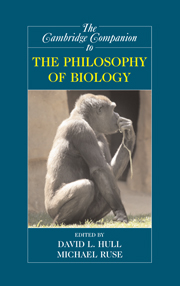Book contents
- Frontmatter
- 1 Adaptation
- 2 Population Genetics
- 3 Units and Levels of Selection
- 4 What’s Wrong with the Emergentist Statistical Interpretation of Natural Selection and Random Drift?
- 5 Gene
- 6 Information in Biology
- 7 Reductionism (and Antireductionism) in Biology
- 8 Mechanisms and Models
- 9 Teleology
- 10 Macroevolution, Minimalism, and the Radiation of the Animals
- 11 Philosophy and Phylogenetics: Historical and Current Connections
- 12 Human Evolution: The Three Grand Challenges of Human Biology
- 13 Varieties of Evolutionary Psychology
- 14 Neurobiology
- 15 Biological Explanations of Human Sexuality: The Genetic Basis of Sexual Orientation
- 16 Game Theory in Evolutionary Biology
- 17 What Is an ‘Embryo’ and How Do We Know?
- 18 Evolutionary Developmental Biology
- 19 Molecular and Systems Biology and Bioethics
- 20 Ecology
- 21 From Ecological Diversity to Biodiversity
- 22 Biology and Religion
- 23 The Moral Grammar of Narratives in History of Biology: The Case of Haeckel and Nazi Biology
- Reference List
- Index
- Series List
3 - Units and Levels of Selection
Published online by Cambridge University Press: 28 April 2008
- Frontmatter
- 1 Adaptation
- 2 Population Genetics
- 3 Units and Levels of Selection
- 4 What’s Wrong with the Emergentist Statistical Interpretation of Natural Selection and Random Drift?
- 5 Gene
- 6 Information in Biology
- 7 Reductionism (and Antireductionism) in Biology
- 8 Mechanisms and Models
- 9 Teleology
- 10 Macroevolution, Minimalism, and the Radiation of the Animals
- 11 Philosophy and Phylogenetics: Historical and Current Connections
- 12 Human Evolution: The Three Grand Challenges of Human Biology
- 13 Varieties of Evolutionary Psychology
- 14 Neurobiology
- 15 Biological Explanations of Human Sexuality: The Genetic Basis of Sexual Orientation
- 16 Game Theory in Evolutionary Biology
- 17 What Is an ‘Embryo’ and How Do We Know?
- 18 Evolutionary Developmental Biology
- 19 Molecular and Systems Biology and Bioethics
- 20 Ecology
- 21 From Ecological Diversity to Biodiversity
- 22 Biology and Religion
- 23 The Moral Grammar of Narratives in History of Biology: The Case of Haeckel and Nazi Biology
- Reference List
- Index
- Series List
Summary
The theory of evolution by natural selection is, perhaps, the crowning intellectual achievement of the biological sciences. There is, however, considerable debate about which entity or entities are selected and what it is that fits them for that role. In this chapter I aim to clarify what is at issue in these debates by identifying several distinct, though often confused, concerns and then identifying how the debates on what constitute the units of selection depend to a significant degree on which of these different questions a thinker regards as central. Chief among these distinctions are replicators versus interactors as well as who benefits from a process of evolution by selection, that is, who benefits in the long run from a selection process and who gets the benefit of possessing adaptations that result from a selection process. Because Richard Dawkins is the primary source of several of the confusions addressed in this essay, I treat his work at some length.
INTRODUCTION
For more than twenty-five years, certain participants in the ‘‘units of selection’’ debates have argued that more than one issue is at stake. Richard Dawkins (1978, 1982a), for example, introduced ‘‘replicator’’ and ‘‘vehicle’’ to stand for different roles in the evolutionary process. He proceeded to argue that the units of selection debates should not be about vehicles, as they had formerly, but about replicators. David Hull (1980) in his influential article ‘‘Individuality and Selection’’ suggested that Dawkins’s ‘‘replicator’’ subsumes two quite distinct functional roles and broke them up into ‘‘replicator’’ and ‘‘interactor.’’ Robert Brandon (1982), arguing that the force of Hull’s distinction had been underappreciated, analyzed the units of selection controversies further, claiming that the question about interactors should more accurately be called the ‘‘levels of selection’’ debate to distinguish it from the dispute about replicators, which he allowed to keep the ‘‘units of debate’’ title.
- Type
- Chapter
- Information
- The Cambridge Companion to the Philosophy of Biology , pp. 44 - 65Publisher: Cambridge University PressPrint publication year: 2007
- 9
- Cited by

